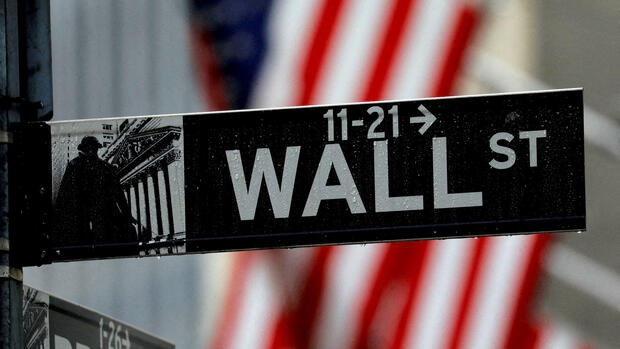Frankfurt Surprisingly strong quarterly earnings from Apple supported Wall Street on Friday. The Dow Jones index of standard values closed 1.7 percent higher at 33,674 points. The broader S&P 500 climbed 1.8 percent to 4,136 points. The index of the technology exchange Nasdaq gained 2.3 percent to 12,178 places. For the Dow Jones index, it was the largest percentage increase in one trading day since the beginning of January. In the week as a whole, the leading index was able to limit its loss to 1.2 percent, the S&P lost 0.8 percent. The Nasdaq was largely unchanged from the previous week.
Above all, strong quarterly figures from Apple support the New York Stock Exchange on Friday. The US tech group posted the second consecutive decline in quarterly sales. However, the minus was only a little more than half as high as feared. Revenues from iPhones even grew surprisingly by 1.5 percent to $51.33 billion. Apple shares gained 4.7 percent. “It’s been a rough week for the stock market and the problems at the US regional banks added to the fear factor, but the Apple numbers were really strong,” said Peter Cardillo, chief economist at Spartan Capital Securities.
Breathing easy at US regional banks after turbulence
The stocks of the US regional banks, which crashed on Thursday after the bankruptcy of the First Republic Bank and the problems at Pacwest, also embarked on a recovery course. Pacwest and Western Alliance shares gained 81 percent and 50 percent, respectively. Rivals such as Zion, KeyCorp, First Horizon, Comerica and Truist rose between eight and almost 20 percent. They partly recouped their recent plunge on renewed concerns about the global banking system.
>> Read also: This small US bank doesn’t want to be confused with the ailing Pacwest – which it is doing now
A media report about a possible sale of the Western Alliance, which the money house has denied, pushed the share down by 30 percent on Thursday. Before that, rival Pacwest had slipped into crisis. In discussions with investors, she is looking for strategic ways out and apparently wants to avoid the fate of the First Republic, which went to JP Morgan in an emergency sale.
According to Reuters calculations, 16 medium-sized banks have lost more than $57 billion in market capitalization since last Friday. The KBW Regional Banking Index fell by a good 30 percent this year. In this month alone it has lost a good twelve percent.
“We clearly have a situation where the market is examining the weakest links after Silvergate, Silicon Valley Bank and First Republic,” said financial market expert Russ Mold of brokerage house AJ Bell.
In addition, surprisingly robust US labor market data eased recession fears following the series of interest rate hikes by the US Federal Reserve. In April, 253,000 new non-farm jobs were added. Economists polled by Reuters had expected just 180,000. “It’s a strong report. It shows the job market is resilient and justifies the Fed’s latest 25 basis point rate hike,” said Spartan Capital Securities Chief Economist Cardillo.
Gold under pressure as oil prices rise
The expectation of further rate hikes after the strong US labor market data weighed on the price of gold. Gold fell 1.7 percent to around $2017 a troy ounce. Recently, the currency had been able to increase significantly after an end to the cycle of interest rate hikes was indicated. “Gold does not pay any interest itself and thus benefits from an environment characterized by falling or low interest rates,” said commodity expert Alexander Zumpfe from precious metal trader Heraeus.
On the other hand, oil prices rose. Analysts spoke of a purely technical chart recovery after three weeks of losses. BOK Financial’s Dennis Kissler said it was attempting to offset the recent fall in prices triggered by concerns about interest rates, banks and demand. The North Sea variety Brent and the light US variety WTI increased in price by about four percent to 75.28 and 71.33 dollars per barrel (159 liters).
Look at other individual values:
Lyft: A disappointing forecast caused the ride service provider Lyft to lose almost 20 percent. Lyft’s attempts to steal market share from competitor Uber with lower fares is putting pressure on its profit margin.
Microchip Technology: Microchip Technology shares fell 1.2 percent. Looking at the semiconductor manufacturer’s quarterly figures, analysts identified risks related to high inventories and demand.
More: Shares in regional banks plummet after Fed rate hike
